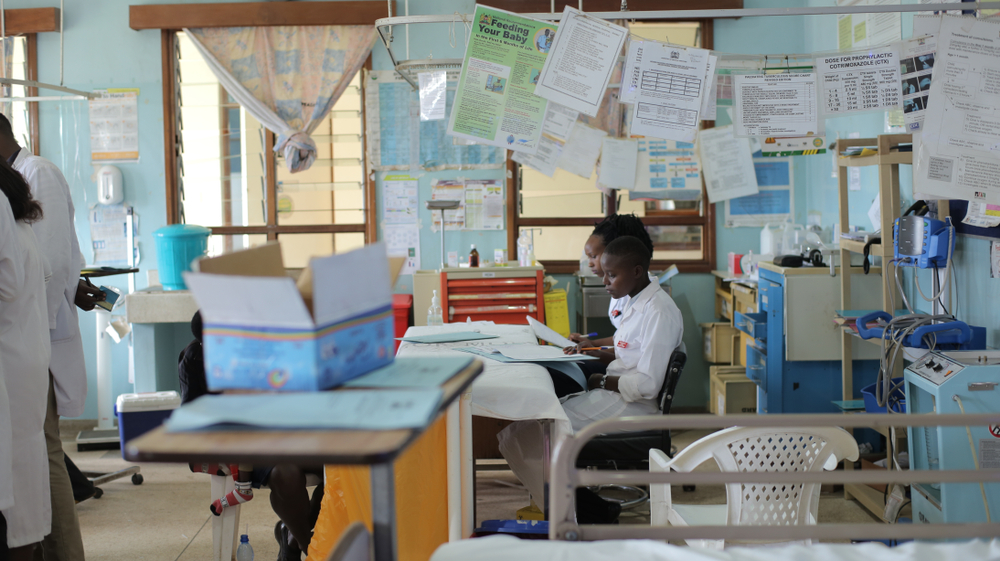Can Community Scorecards Improve the Quality of Family Planning Services in Kenya?

Researchers partnered with IPA Kenya and the Kisumu County Department of Public Health to assess whether a youth-led social accountability intervention—community scorecards—improved the quality of family planning services at healthcare facilities. Although the scorecards indicated perceived improvements in service quality, there was no actual change in quality and a decrease in the share of women receiving family planning services.
Despite the success of family planning programs in many other regions, contraceptive access in sub-Saharan Africa remains low.1 In Kenya, 20 percent of women have an unmet need of modern family planning services, corresponding with high maternal mortality rates at 362 deaths per 100 thousand live births.2 Thus, improving contraceptive access is essential to improve reproductive health. However, women can face challenges accessing family planning services from their health providers, including high absenteeism, informal fees, and strict and unnecessary requirements.3 Though limited, evidence from other countries in East Africa have found that community pressure through social accountability interventions changed provider behaviors to improve service delivery and health outcomes, including contraception use.4 Can this approach be effective to reduce barriers to family planning services in Kenya?
Researchers partnered with IPA Kenya and the Kisumu County Department of Public Health to assess whether community scorecards for healthcare facilities improved the quality of family planning services and reduced negative provider behaviors. The study took place in three healthcare facilities in their corresponding communities in Kisumu County in western Kenya. To ensure young people’s perspectives on family planning services were incorporated, the intervention was implemented by Youth Working Groups with 4-6 members aged 18-30.
The community scorecard process had several steps. Each community identified and prioritized family planning services that needed improvement and created indicators, which then informed the scorecards to monitor providers’ progress. The providers also used a scorecard to do a self-assessment of their services. After this, communities and providers came together to develop an action plan to improve care quality. The scorecards measured perceived changes in care quality, while researchers used several methods to evaluate actual changes. These methods included visits by mystery clients, unannounced visits by research staff, and focus group discussions with the Youth Working Group members and providers.
The community scorecards indicated improvements in provider care, particularly in issues that were voted highest priority, although most changes were mild at best. However, the perceived improvements did not translate into actual improvement, as the findings from mystery client visits and unannounced visits revealed no changes in provider absenteeism, informal fees, disrespectful care, and waiting times. Furthermore, results showed that the share of women accessing family planning services at the facilities declined. Researchers suggest that the lack of impact by the community scorecards was due to three factors: implementing during COVID-19 which created challenges to the health system everywhere, deviation from the intervention’s design and purpose, and that some providers used the community scorecards to justify their practices rather than improve them.
Sources
1.Ouedraogo, Leopold, Desire Habonimana, Triphonie Nkurunziza, Asmani Chilanga, Elamin Hayfa, Tall Fatim, Nancy Kidula, Ghislaine Conombo, Assumpta Muriithi, and Pamela Onyiah. "Towards achieving the family planning targets in the African region: a rapid review of task sharing policies." Reproductive Health 18 (2021): 1-12.
2.National Bureau of Statistics Nairobi K. Republic of Kenya Kenya Demographic and Health Survey 2014. 2015.
3.Tumlinson, Katherine, Laura E. Britton, Caitlin R. Williams, Debborah Muthoki Wambua, and Dickens Otieno Onyango. "Informal payments for family planning: prevalence and perspectives of women, providers, and health sector key informants in western Kenya." Sexual and Reproductive Health Matters 29, no. 1 (2021): 336-352.
Tumlinson, Katherine, Laura E. Britton, Caitlin R. Williams, Debborah Muthoki Wambua, and Dickens Otieno Onyango. "Absenteeism among family planning providers: a mixed-methods study in western Kenya." Health Policy and Planning 37, no. 5 (2022): 575-586.
Tumlinson, Katherine, Laura E. Britton, Caitlin R. Williams, Debborah Muthoki Wambua, Dickens Otieno Onyango, and Leigh Senderowicz. "Provider verbal disrespect in the provision of family planning in public-sector facilities in Western Kenya." SSM-Qualitative Research in Health 2 (2022): 100178.
4.Björkman M, Svensson J. Power to the people : evidence from a randomized feld experiment of a community-based monitoring project in Uganda. 2007.
Gullo S, Galavotti C, Altman L. A review of CARE’s Community Score Card experience and evidence. Health Policy Plan. 2016;31(10):1467–78.
Gullo S, Galavotti C, Kuhlmann AS, Msiska T, Hastings P, Marti CN. Effects of a social accountability approach, CARE’s Community Score Card, on reproductive health-related outcomes in Malawi: a cluster-randomized controlled evaluation. PLoS One. 2017;12(2):e0171316.
Implementing Partner












